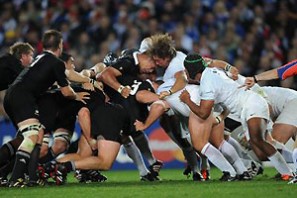Super Rugby teams round 10: Marky Mark replaces Pietsch, Rebels' LSL blow, Flook boost for Reds, Alaalatoa to start
After a few weeks of byes Super Rugby is back to all hands on deck in round 10 with some huge clashes on the…

In the gladiatorial sport known as rugby, a team sends forward eight of their biggest and strongest men to compete in hand-to-hand warfare unlike any other.
These men do not work as individuals but as a unit of strength and power. They are designed to overpower and break their counterparts to allow the faster, more agile men space to play. Set pieces require these men to be solid and strong so the back line can do what they do best.
The psychology of the scrum is often overlooked and never really given any praise. The scrum is a display of superior technique, strength and power and is a weapon more devastating than try scoring. Scoring points is the object of the game and how a teams wins, but these points are scored as a result of psychological warfare.
If a team is better than their opponents at set pieces – the line out, the scrums – they can build a game based on the fact they have made the opposition fear the natural plays of the game. A team that dominates at scrum time, causing the other team to step backwards, has almost already won the game, even if a point hasn’t been scored. Besides that, rugby physics comes into play: it’s difficult to gain forward movement or momentum when a pack is being shunted backwards.
A splintered or collapsed scrum results in a penalty, which can be converted into points or field position, so a team needs to ‘crush’ during these plays to gain the edge and momentum. When they bind up into a scrum, the dominant team can smell the opposition’s fear as they shunt them backwards – it’s one of the best feelings for the tight five. Seeing their strongest men being mauled and toyed with instils doubt into the entire opposition.
The game of rugby is about building pressure through continued plays and phases – the longer a team can maintain possession, the better the chances of winning. To force this point home, the close-quarter battles – scrums, rucks and mauls – need to be won. A maul would be the most dangerous play to protect with the ‘use it or lose it’ law, but the percentages of losing a maul are low compared with scrums.
A forced tight head scrum will lift a team and give them belief that continued pressure will win the game. When a team loses their own ball in a set piece, it’s a dent in the armour and allows the opposing team to rub the salt into the wound. The wounds of being beaten in a hand-to-hand situation don’t just last for the game, but carry on into the following games so that the next time the opponents face off, the doubt remains.
Psychological warfare is a weapon far too often overlooked in the game of rugby, and needs to be highlighted more often – ask any front rower.